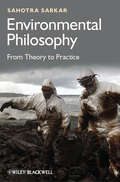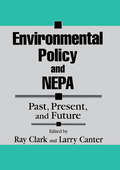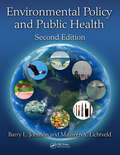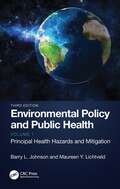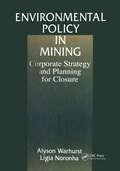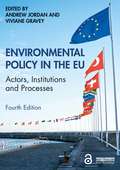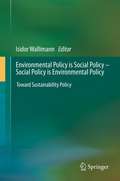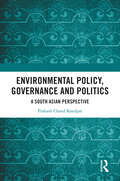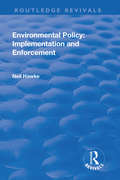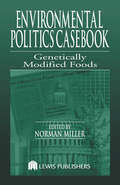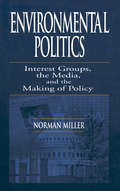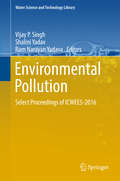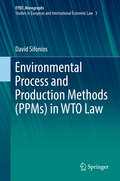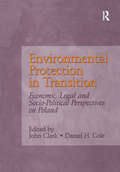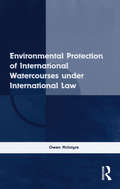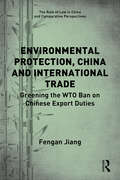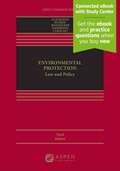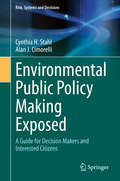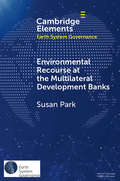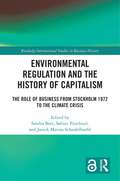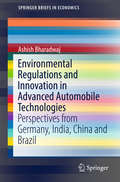- Table View
- List View
Environmental Philosophy: From Theory to Practice (Cambridge Studies In Philosophy And Biology Ser.)
by Sahotra SarkarThe first comprehensive treatment of environmental philosophy, going beyond ethics to address the philosophical concepts that underlie environmental thinking and policy-making today Encompasses all of environmental philosophy, including conservation biology, restoration ecology, sustainability, environmental justice, and more Offers the first treatment of decision theory in an environmental philosophy text Explores the conceptions of nature and ethical presuppositions that underlie contemporary environmental debates, and, moving from theory to practice, shows how decision theory translates to public policy Addresses both hot-button issues, including population and immigration reform, and such ongoing issues as historical legacies and nations' responsibility and obligation for environmental problems Anchors philosophical concepts to their practical applications, establishing the priority of the discipline's real-world importance
Environmental Policy and NEPA: Past, Present, and Future
by Ray Clark Larry CanterEnvironmental Policy and NEPA is a concise study of environmental policy-where we have come from, what we are facing and where we can go in the future. An outgrowth of initiatives taken by the Council of Environmental Quality (CEQ), and edited by the current Associate Director, this publication studies the effectiveness and efficiency of the implementation of the National Environmental Policy Act (NEPA).Divided into three main sections, part one covers the historical background and trends of NEPA. Part two addresses current substantive and conceptual issues associated with the environmental impact assessment (EIA) process. Part three discusses future opportunities including impact on humans, effective public participation in the EIA process and the need for sustainability.This excellent reference brings together 28 contributing authors who combine their expertise to address a multitude of topics. Environmental Policy and NEPA is mandatory reading for the professional, researcher, government policymaker, activist, student or anyone looking for a complete presentation of the EIA process.
Environmental Policy and Public Health
by Barry L. Johnson Maureen Y. LichtveldAs with the first edition, this second edition describes how environmental health policies are developed, the statutes and other policies that have evolved to address public health concerns associated with specific environmental hazards, and the public health foundations of the policies. It lays out policies for what is considered the major environmental physical hazards to human health. Specifically, the authors describe hazards from air, water, food, hazardous substances, and wastes. To this list the authors have added the additional concerns from climate change, tobacco products, genetically-modified organisms, environment-related diseases, energy production, biodiversity and species endangerment, and the built environment. And as with the first edition, histories of policymaking for specific environmental hazards are portrayed. This edition differs from its antecedent in three significant themes. Global perspectives are added to chapters that describe specific environmental hazards, e.g., air pollution policies in China and India. Also there is the material on the consequences of environmental hazards on both human and ecosystem health. Additionally readers are provided with information about interventions that policymakers and individuals can consider in mitigating or preventing specific environmental hazards.
Environmental Policy and Public Health: Emerging Health Hazards and Mitigation, Volume 2
by Barry L. Johnson Maureen Y. LichtveldWritten by environmental health experts with long teaching and professional careers in policy and public health, the third edition of Environmental Policy and Public Health comprises two volumes, addressing key physical hazards in the environment that impact public health. The first volume on Principal Health Hazards and Mitigation is complemented by the second volume, Emerging Health Hazards and Mitigation. Volume 2 discusses emerging health hazards and mitigation including environment-related infectious diseases, COVID-19 pandemic, social justice, and drugs and public health. New in this volume are a chapter on firearms violence as a public health hazard, a chapter on transportation and how built environments can affect human health and social well-being, and a chapter on noise and light pollution. As human populations increase and technology adds more devices to daily use that generate noise and light, adverse human and ecological health effects have become recognizable and require time-sensitive policy actions to mitigate and where possible prevent adverse health effects. Each chapter explains with great clarity how new environmental health issues are translated into public health policies. The volume concludes with case studies and practice questions to facilitate interactive learning for upper-level undergraduate and graduate students taking courses in public health and environmental sciences. The case studies and practice questions allow for a diverse portfolio of in-person and hybrid pedagogical strategies and tools at the fingertips of faculty who not only teach policy courses but whose course topics have policy relevance, such as climate and health.
Environmental Policy and Public Health: Principal Health Hazards and Mitigation, Volume 1
by Barry L. Johnson Maureen Y. LichtveldWritten by environmental health experts with long teaching and professional careers in policy and public health, the third edition of Environmental Policy and Public Health comprises two volumes addressing key physical hazards in the environment that impact public health. The first volume on Principal Health Hazards and Mitigation is complemented by the second volume, Emerging Health Hazards and Mitigation. The health of the environment is inextricably linked to that of people. Thoroughly updated, Volume 1 describes how the quality of air, water, and food is threatened by the presence of toxic substances and explains why climate change is a global health priority already impacting human health and the environment. The mitigations discussed in this volume are twofold: policies that are intended for control of specific hazards and suggested hazard interventions. The role of policy in addressing each of these key environmental health areas is extensively discussed in this volume as well. Each chapter explains step by step how new environmental health issues are translated into public health policies and concludes with practice questions to facilitate interactive learning for upper-level undergraduate and graduate students taking courses in public health and environmental sciences. The step-by step approach, as well as the case studies and practice questions, allow for a diverse portfolio of in-person and hybrid pedagogical strategies and tools at the fingertips of faculty who not only teach policy courses, but whose course topics, such as climate and health, have policy relevance.
Environmental Policy in Mining: Corporate Strategy and Planning
by Alyson Warhurst Ligia NoronhaEcological Management of Mining: Achieving Environmental Compliance is a study and comparison - global in scope - of current practices used by mining firms striving for ecological management. The author takes an integrated and interdisciplinary approach in addressing, analyzing and working towards solutions regarding the complex challenges posed by managing the environmental impacts of mining. The issues addressed range from the ecotoxicological effects of metal residues to the land use effects of mining and from socioeconomic impacts to environmental regulation. The goal of this book is to assist mining companies throughout the world to achieve environmental compliance and improve competitiveness in the context of growing environmental regulation and technological innovation. It is an essential book for the wide variety of professionals working on issues in mining. Like the book and the research itself, the audience is integrated and interdisciplinary including engineers, planners, ecologists, policy makers and economists.
Environmental Policy in the EU: Actors, Institutions and Processes
by Andrew Jordan Viviane GraveyThe European Union (EU) has a hugely important effect on the way in which environmental policies are framed, designed and implemented in many parts of the world, but especially Europe. The new edition of this leading textbook provides a state-of-the-art analysis of the EU’s environmental policies. Comprising five parts, Environmental Policy in the EU covers the rapidly changing context in which EU environmental policies are made, the key actors who interact to co-produce them and the most salient dynamics of policy making, ranging from agenda setting and decision making, through to implementation and evaluation. Written by leading international experts, individual chapters examine how the EU is responding to a multitude of different challenges, including biodiversity loss, climate change, energy insecurity, and water and air pollution. They tease out the different ways in which the EU’s policies on these topics co-evolve with national and international environmental policies. In this systematically updated fourth edition, a wider array of learning features are employed to ensure that readers fully understand how EU environmental policies have developed over the last 50 years and how they are currently adapting to the rapidly evolving challenges of the twenty-first century, including the COVID-19 pandemic. It is an essential resource for undergraduate and postgraduate students studying environmental policy and politics, climate change, environmental law and EU politics more broadly.
Environmental Policy in the EU: Actors, institutions and processes
by Andrew Jordan Camilla AdelleThe European Union (EU) has a hugely important effect on the way in which environmental policies are framed and implemented in many different parts of the world, but especially Europe. The new and comprehensively revised edition of this well-known textbook provides a state-of-the-art analysis of all the EU’s environmental policies. Comprising five parts, it covers the rapidly changing context in which EU environmental policies are made, the key actors who interact to co-produce policy and the most salient dynamics of policy making, ranging from decision making through to implementation and evaluation. Written by leading experts in the field, individual chapters examine how the EU is responding to a multitude of different problems including biodiversity loss, climate change, energy insecurity, and water and air pollution. They tease out the many important ways in which the EU's policies on these topics co-evolve with national and international environmental policies. In this third edition a mixture of learning features are employed to ensure that undergraduate and postgraduate students fully understand how EU policies in this vital area developed in the past and how they are now adapting to the rapidly evolving challenges of the twenty-first century.
Environmental Policy is Social Policy – Social Policy is Environmental Policy
by Isidor WallimannThis book argues that social and environmental policy should be synthetically treated as one and the same field, that both are but two aspects of the same coin - if sustainability is the goal. Such a paradigm shift is indicated, important, and timely to effectively move towards sustainability. This book is the first to take this approach and to give examples for it. Not to synthetically merge the two fields has been and will continue to be highly insufficient, inefficient and contradictory for policy and public administration aiming for a transformation towards a sustainable world. In general, social problems are dealt with in one "policy corner" and environmental problems in another. Rarely is social policy (at large) concerned with its impact on the environment or its connection with and relevance to environmental policy. Equally, environmental problems are generally not seen in conjunction with social policy, even though much environmental policy directly relates to health, nutrition, migration and other issues addressed by social policy. This book intends to correct the pattern to separate these very significant and large policy fields. Using examples from diverse academic and applied fields, it is shown how environmental policy can (and should) be thought of as social policy - and how social policy can (and should) simultaneously be seen as environmental policy. Tremendous benefits are to be expected.
Environmental Policy, Governance and Politics: A South Asian Perspective
by Prakash Chand KandpalThis book traces the development-environment discourse in India and examines the multi-layered interaction between society and nature in the light of the role of the state, judiciary and the civil society. Through an array of perspectives, the volume challenges the conventional approach to understanding the environmental politics in South Asia without considering the role of the civil society and other informal actors, which has radically altered the conventional articulation of the phenomenon.The volume underlines distinct structural characteristics of developmental politics in India and the social concerns and challenges which come in the way of environmental policy and governance in India. It is a meaningful intervention in unearthing significant socio-political and economic processes which are critical to the environmental governance in India. The book will not only be helpful in studying the state of policy, administration and politics of environmental discourse in India, but also guide the policymakers to explore the sustainable ways of environmental governance in South Asia.Insightful and lucid, this book will be useful to the students, researchers and faculty working in the field of political science, public administration, public policy, political sociology, political economy and governance studies. It will also be an invaluable and interesting reading for those interested in South Asian studies.
Environmental Policy: Implementation and Enforcement (Routledge Revivals)
by Neil HawkeThis title was first published in 2002. Environmental Policy is an astute and far-reaching text which analyzes the intersections between environmental policy formation and its ultimate implementation and enforcement through the law. It sets this theme against the axis of EU law and policy and UK law and policy, paying particular attention to the variables which determine the nature and significance of law as a delivery vehicle . Among these variables are the shape and character of EU and UK law for present purposes, alternatives to law, and the culture of UK law and policy aiding a distinct pattern of response to Directives, for example. It takes an informed look at the reality of implementation and enforcement through its reference to policy objectives as well as the limits and appropriateness of law across the aforementioned axis . An indispensable resource for scholars and students of environmental law and policy, along with governmental and other environmental agencies responsible for policy creation, implementation and enforcement.
Environmental Politics Casebook: Genetically Modified Foods
by Norman MillerEnvironmental Politics Casebook: Genetically Modified Foods includes testimony, journal and newspaper articles, book chapters, and interest group communications such as press releases and on-line briefs, as well as other studies and reports that constitute the principal elements of the public debate on the genetic modification of food. A companion
Environmental Politics: Interest Groups, the Media, and the Making of Policy
by Norman MillerAt every stage, environmental policy is the result of the combat of stakeholders interested in, and affected by, the problem being addressed and the range of possible solutions. The combatants include any or all of the following: the federal government, environmental advocacy groups, and business, the media, the scientific community, think tanks, NGOs of every stripe, trade associations and professional organizations, and even state and local governments, each of whom have their own interests in the resulting policy. Environmental Politics: Interest Groups, the Media, and the Making of Policy discusses political battles over the environment from ground level - as they are fought in legislative chambers, the daily newspaper, on television, and, increasingly, on the Internet. The text explores environmental politics as a clash of interests, not ideologies, and environmental policy as a result of the reconciliation of those interests.
Environmental Pollution
by Vijay P Singh Shalini Yadav Ram Narayan YadavaThis book comprises select proceedings of the International Conference on Water, Environment, Energy and Society. The book is divided into five parts. The first part deals with some aspects of environmental pollution such as socio-economic environment assessment for sustainable development, environmental issues due to fire in coal Mines and its impact and suggestions for implementing precautionary and control measures, redevelopment of urban slum dwellings: issues & challenges, air and noise pollution in mega cities, importance of indoor environmental quality in green buildings. Part II discusses pollution indicators such as assessment and prediction of environmental noise, fuzzy logic based performance evaluation, fish biodiversity and its periodic reduction, effects of anthropogenic activities on fresh water ecosystems, and monitoring of air pollution. Part III focuses on generation of pollution namely biomedical waste generation and management, heavy metal leaching, etc. Water quality assessment is described in Part IV. The Part V presents water quality modeling. The book will be of interest to researchers and practitioners in the field of water resources, hydrology, environmental resources, agricultural engineering, watershed management, earth sciences, as well as those engaged in natural resources planning and management. Graduate students and those wishing to conduct further research in water and environment and their development and management will also find the book to be of value.
Environmental Process and Production Methods (European Yearbook of International Economic Law #3)
by David SifoniosThis book examines the conditions under which PPM measures may be adopted under WTO law de lege lata and de lege ferenda. It analyses in detail the complex case law in this field and its evolution in the last 25 years, as well as the many doctrinal debates around PPM measures and their relevance in the light of the evolution of case law, both under the GATT and the TBT Agreement. Further, it also suggests an original approach to the interpretation of the relevant provisions of the GATT and the TBT Agreement in the context of PPM measures. The PPM issue has been one of the most debated topics in the trade and environment debate. Even though the US-Shrimp case showed that PPM measures are not prohibited per se under the GATT, many questions remain unanswered when it comes to the precise conditions under which environmental PPM measures are justifiable under WTO law, for example in the field of trade measures relating to climate change mitigation efforts, natural resources management policies and biodiversity conservation measures.
Environmental Protection and Human Rights
by Donald K. Anton Dinah SheltonWith unique scholarly analysis and practical discussion, this book provides a comprehensive introduction to the relationship between environmental protection and human rights being formalized into law in many legal systems. This book instructs on environmental techniques and procedures that assist in the protection of human rights. The text provides cogent guidance on a growing international jurisprudence on the promotion and protection of human rights in relation to the environment that has been developed by international and regional human rights bodies and tribunals. It explores a rich body of case law that continues to develop within states on the environmental dimension of the rights to life, to health, and to public participation and access to information. Five compelling contemporary case studies are included that implicate human rights and the environment, ranging from large dam projects to the creation of a new human right to a clean environment.
Environmental Protection in Transition: Economic, Legal and Socio-Political Perspectives on Poland
by John Clark Daniel H. ColeThis book takes an interdisciplinary look at environmental protection during Poland’s transition to market democracy. The contributors are recognised experts in their fields, making this an authoritative volume, combining the perspectives of economists, legal scholars, political scientists and sociologists.
Environmental Protection of International Watercourses under International Law
by Owen McIntyreMcIntyre's work explains the legal means by which requirements of environmental protection influence the determination of a reasonable and equitable regime for allocating rights to riparian states to utilize shared freshwater resources. The work examines the means and processes by which environmental considerations can act upon the operation of the principle of equitable utilization. The volume provides a comprehensive analysis of the subject, outlining the development, scope and operation in general and customary international law of key rules of environmental protection.
Environmental Protection, China and International Trade: Greening the WTO Ban on Chinese Export Duties (The Rule of Law in China and Comparative Perspectives)
by Fengan JiangThis book argues for a balanced approach to ‘greening’ the World Trade Organization (WTO) ban on China’s export duties without opening the floodgates to protectionism. As a result of the China—Raw Materials and China—Rare Earths decisions, China is largely prohibited from using export duties to address environmental problems, including those associated with climate change. This is despite a number of climate studies having suggested that Chinese export duties could be useful for reducing carbon leakage, an issue of international concern. This book puts the case for a more balanced approach. It shows that a harsh ban on China’s export duties constrains its policy space to protect the environment, particularly in the context of climate change. The work presents feasibility tests for various legal solutions that have been discussed for adjusting the ban, and it accordingly proposes a more feasible approach that would allow China to help protect the environment without advancing protectionism. The proposed legal option provides a less protectionist alternative to export duties, namely ‘export duties plus’: export duties in combination with supplementary restrictions on Chinese consumption. This analysis also yields insights regarding ways to correct WTO precedents, which suggests a moderate alternative response to an important issue behind the Appellate Body crisis. The book will be a valuable resource for academics, researchers and policymakers in the areas of International Trade Law, Environmental Law and China.
Environmental Protection: Law and Policy (Aspen Casebook)
by Robert L. Glicksman Emily Hammond William W. Buzbee Alejandro Camacho Daniel R. MandelkerEnvironmental Protection: Law and Policy, respected for its intellectual breadth and depth, is an interdisciplinary overview of Environmental Law, incorporating history, theory, litigation, regulation, policy, science, economics, and ethics. It covers the history of environmental protection; policy objectives; regulatory design strategies; and constitutional federalism and related statutory interpretation issues concerning the design and implementation of the environmental laws. <p><p>Coverage also includes the Clean Air Act, the Clean Water Act, the Resource Conservation and Recovery Act, CERCLA, and other pollution control statutes; a chapter on climate change that discusses scientific, policy, program design, and statutory authority questions; and natural resource management issues (including the National Environmental Policy Act, the Endangered Species Act, and limited coverage of national forest management).
Environmental Public Interest Litigation in China
by Xiaobo Zhao Xi Wang Noeleen McNamaraThis book offers readers an accessible and broad-ranging guide to Environmental Public Interest Litigation (EPIL), which has burgeoned in China over the past decade. The aim of this book is to provide a systematic review of Chinese experiences with EPIL in environmental matters, both with a view to gauging its success to date and well as discussing some more critical aspects. To this end, the book systematically examines the establishment and development of EPIL in China's legal, social, and political contexts. It examines particularly the significant role and functions of EPIL in China's environmental governance, and the far-reaching impacts on Chinese civil society and governments. It also offers readers an insiders' perspective in terms of procedural and substantive issues with respect to EPIL, by reviewing the institutional designs, theoretical underpinnings and specific mechanisms, the roles of various participants and stakeholders involved in this legal process. At the same time, it studies leading EPIL cases raised from environmental pollution, natural resource damage and ecological damage, and the effectiveness of environmental adjudication that sustains EPIL as a new form of judicial instrument. This book is written to remedy the gap between Chinese and English literature in this area of law. The analysis of these issues, through a historic and comparative perspective, reveals the strengths and weaknesses of the current legal regime and serves as a basis for recommendations for bringing about more effective EPIL in China.
Environmental Public Policy Making Exposed: A Guide for Decision Makers and Interested Citizens (Risk, Systems and Decisions)
by Cynthia H. Stahl Alan J. CimorelliThis book exposes the barriers to inclusive and effective public policy making, which are the current decision making paradigm and commonly held ideas that reduce public policy problems to scientific and technical ones. Through both environmental policy and other decision making examples, readers are shown the commonalities of all decision making. Solution-oriented practitioners and stakeholders will find this book filling a conceptual and methodological gap in existing policy literature and practice. The authors deftly guide readers from post-normal science, wicked problems, and uncertainty concepts to a conceptually-grounded, practical implementation of a new approach, the open solution approach. The Multi-criteria Integrated Resource Assessment (MIRA) is described as the first generation methodology that fulfills the expectations for the inclusive, transparent, and learning-based open solutions approach. MIRA is a holistic package of concepts, methods and analytical tools that is designed to assess Decision Uncertainty, the combined uncertainties that include data, problem formulation, expert judgments, and stakeholder opinions. Introduction of the Requisite Steps, the common steps found in all decision making, provides the yardstick for evaluating a variety of decision making processes, decision tools, and commonly found indices such as the Dow Jones Industrial Average or the Newsweek Green Ranking of corporations. The use of anecdotes, policy stories, and case examples makes this a very readable and practical book for citizens and experts. With this book, readers are prepared to critically evaluate these common indices for their personal use as well as challenge policy processes as a stakeholder. For policy practitioners, this guidebook will become a rubric to ensure an effective public policy making process and to critically evaluate decision support tools.
Environmental Recourse at the Multilateral Development Banks (Elements in Earth System Governance)
by Susan ParkGlobal governance now provides people with recourse for harm through International Grievance Mechanisms, such as the Independent Accountability Mechanisms of the Multilateral Development Banks. Yet little is known about how such mechanisms work. This Element examines how IGMs provide recourse for infringements of three procedural environmental rights: access to information, access to participation, and access to justice in environmental matters, as well as environmental protections drawn from the United Nations Guiding Principles and the World Bank's protection standards. A content analysis of 394 original IAM claims details how people invoke these rights. The sections then unpack how the IAMs provide community engagement through 'problem solving', and 'compliance investigations' that identify whether the harm resulted from the MDBs. Using a database of all known submissions to the IAMs (1,052 claims from 1994 to mid-2019), this Element demonstrate how the IAMs enable people to air their grievances, without necessarily solving their problems.
Environmental Regulation and the History of Capitalism: The Role of Business from Stockholm 1972 to the Climate Crisis (Routledge International Studies in Business History)
by Sandra Bott Janick Marina Schaufelbuehl Sabine PitteloudThis edited collection examines the historical role of business actors in climate and environmental governance since the 1970s. Through a compilation of recent, evidence-based historical research, this book unveils the origins of contemporary challenges in regulating environmental pollution. With original case studies, it offers a nuanced understanding of the environmental counter-offensive orchestrated by business leaders, associations, and think tanks post-1972, following the United Nations' pivotal Stockholm Conference on the Human Environment. Readers are presented with insights into the historical maneuvers of business entities aimed at mitigating regulatory risks, co-creating expertise, and framing the environmental debate. From revealing the tactics employed by various business actors to exploring the emergence of market-driven environmentalism, this volume offers a comprehensive exploration of the intricate dynamics shaping environmental policy. By contextualizing specificities and complexities, it enriches contemporary narratives on business influence and power dynamics within global capitalism. This book primarily caters to scholars across diverse historical disciplines, including business history, international relations, environmental history, and the history of capitalism. Additionally, it holds relevance for social scientists studying contemporary issues, policymakers grappling with environmental challenges, and those seeking a deeper understanding of the historical dimensions of climate governance.The Open Access version of this book, available at http://www.taylorfrancis.com, has been made available under a Creative Commons Attribution-Non Commercial-No Derivatives (CC BY-NC-ND) 4.0 license.
Environmental Regulations and Innovation in Advanced Automobile Technologies: Perspectives From Germany, India, China And Brazil (SpringerBriefs in Economics)
by Ashish BharadwajThe book examines innovation in environment-friendly technologies in the automobile industry. The focus of the book are Germany (a technology leader in the global automobile industry), on the one hand, and India, China and Brazil (technologically proficient emerging technology leaders) on the other hand. Patents have been used as a metric to measure and understand innovation. The book traces the evolution of regulatory standards in the automobile industry, relies on a unique patent dataset, and draws on a number of interviews conducted with regulators and engineers to get a better picture of how environmental policies and standards, including emission norms and fuel requirements, have developed overtime and now the industry has responded. The book’s core argument is that technological innovation is what has driven the industry in the past 125 years, but, at the same time, the industry has created problems and faced controversies with regard to its path dependency on carbon-intensive technologies. As a result, we have witnessed growing role of environmental regulators in ensuring that the growth path of the automobile industry, a powerhouse of growth of several economies, is aligned with the larger goals of addressing climate change and energy concerns. Against the backdrop of the emergence of Brazil, China and India in the global economy, the book focuses on the developments in these three countries, and draws parallels with Germany, which benefited from first mover advantage in technology and a substantial head-start in implementing cogent environmental policies. A standardized International Patent Classification (IPC) system has been used to, first, construct an index of regulatory stringency, based on regulations that came about between 1985 and 2010; and second, construct a unique cross-country weighted patent dataset for technologies invented in the past two and a half decades.
